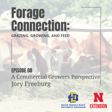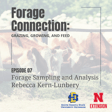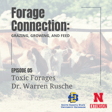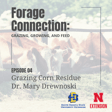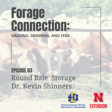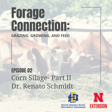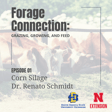Become a Creator today!Start creating today - Share your story with the world!
Start for free
00:00:00
00:00:01

Northern Plains Forage Assn: David Elliot and Jeff Jackson
We talk to David Elliot (Pres) and Jeff Jackson (VP) of the Northern Plains Forage Association about this new organization and why connecting with others interested in forages matters.
Transcript
Introduction to the Forage Connection Podcast
00:00:05
Speaker
It's the Forage Connection, grazing, growing, and feed with your hosts, Ben. And Sarah.
Introducing the Northern Plains Forage Association
00:00:10
Speaker
Today, we're going to look into a local resource for forage producers in South Dakota and Nebraska, the Northern Plains Forage Association.
Meet the NPFA Leaders: David Elliott & Jeff Jackson
00:00:18
Speaker
Well, this morning we have a couple special guests with us. We get to interview two people. We've got David Elliott, who is the operations manager at Drum Goo and Dairy in southeastern, eastern South Dakota there, north of Brookings.
00:00:34
Speaker
and David is kind of the jack of all trades I'd say as operations manager he does a little bit of everything there at the dairy and we also have Jeff Jackson with us who is the forage specialist for the area with cropland. Jeff also has some
00:00:52
Speaker
ties to South Dakota. He was here a long time. He's in Missouri now, but you oftentimes hear or see of him when we talk forages and cropland is involved. So we're really excited to have these two with us today.
The Vision and Goals of NPFA
00:01:05
Speaker
And one special thing to point out about them is they're also the president and vice president of the Northern Plains Forage Association.
00:01:13
Speaker
which is a new association that was established about a year ago in the Northern Plains region and we're mostly South Dakota based. We've got an Iowa member on the board and we really reach out to the entire area of the Northern Plains, so several states. This group has some pretty big goals and is picking up membership one member at a time but doing pretty well for just being
00:01:37
Speaker
here for a year. So today we're going to talk about the association, what it is, and why it's here. Why did this get started? So before we get too far into that, David, can you tell us a little bit more about yourself and why you got involved with this effort?
David Elliott's Journey & Role in NPFA
00:01:54
Speaker
Yeah, my name is David Elliott. I am, along with my parents, we manage a drum goon dairy.
00:02:03
Speaker
We came here in 2006. I was 14 at the time, and we brought our whole family, our immediate family, and moved to build a 1,400 cow dairy farm, leaving our 150 cow dairy farm home in Northern Ireland. And came here and have definitely benefited from South Dakota, the great soils, the great forages you can grow.
00:02:31
Speaker
And that has allowed us to expand our herd up to 6,500 cows presently. And yeah, I got invited into the Forge Association by Sarah. They were looking for board members. And then somehow I ended up being the president of the whole thing. But definitely have enjoyed our meetings and enjoyed the connections I've made through it. It's a great organization, although very new. But we've got big things coming.
00:03:04
Speaker
Well, thanks, David. And I like how you say that you somehow ended up being president. You're a very fitting role for president. And I think you were somewhat elected or appointed to that position. It wasn't just me. I'm not going to take the credit for that. It was a free and fair election, I think. No, but David's been a great asset. He's done a lot of work and he has a really important
00:03:27
Speaker
job there with the dairy so we really appreciate the extra time you take to put into this and I know just like Jeff you're both really busy people but we always say that busy people get the job done right so that's just that's just how it goes.
Jeff Jackson's Expertise & NPFA Involvement
00:03:41
Speaker
So Jeff can you tell us a little bit about yourself and why or how you got involved with this? So I tell you this I think goes all I joke about this all the time they call me a forage specialist
00:03:55
Speaker
I am in the hay business myself to a degree. I do a bunch of small square hay bales and I joke with people that I should actually not like the alfalfa industry or the hay business at all because I grew up at home with a small square baler and no mechanical means to handle anything. So I should really not like it at all. So glutton for punishment, not smart. I don't know where this goes.
00:04:21
Speaker
I grew up on a small family farm in Northwest Iowa, went to South Dakota State University, had the pleasure of being in Brookings for about 27 years. I joke with state people too that sometimes they have a false and deceptive advertising there because they say, come to state, you can go anywhere from here. I joked
00:04:44
Speaker
that something was wrong with that model because I'd been trapped in Brookings for 25 or 26 years and everybody said it wasn't the school that was my personality that did it. So I went to South Dakota State, started a career in agronomy business at a local retail, had the opportunity to move to
00:05:04
Speaker
cropland as a district sales manager and spent five years doing that. Now, I've been a full-time forage guy for 15 years. I spent a lot of that time, yes, in the I-29 corridor helping with the dairy business. The fun thing for me is I met the Elliott family and David's parents right away in 2006 when they all came to town. That was my first year as a full-time forage guy.
00:05:33
Speaker
It's been kind of fun for me to watch David come through some of this too. Even though he doesn't realize it, I've watched him from the background. So interesting enough. And I get to do a lot of technical support on Forage.
00:05:48
Speaker
production whether it's variety selection fertility insects management all that kind of stuff so very similar to what you guys do from a you know public standpoint I get to do that on the private industry side and
00:06:05
Speaker
my territory has basically covered exactly the area that we are representing with this Northern Plains Forge Association. So Western Iowa, Western Minnesota, South Dakota, North Dakota, Nebraska, Kansas, whatever we want to consider the Northern Plains. So it's been fun for me to see this all come to light right now. And so yeah, I get to do a lot of that technical support.
00:06:34
Speaker
in those areas. And now I live about 30 minutes north of Kansas City on the Missouri side. And it's neat for me to get outside my comfort zone into a different box, if you will, to see different management practices, different pieces on a more intimate level versus living in one area and traveling outside. It's nice also to go spend some time doing production in another area. So kind of fun. So considering
00:07:02
Speaker
the background you both have and your involvement on the board. When you think back to how this all got started, where do you see association finding its place in the forage industry as we kind of move forward? You know, originally this whole thing plant, the seed planted itself, there was a few people from the area at a meeting, at a regional meeting. And we were like, geez, there's just nothing happening in
00:07:33
Speaker
South Dakota for a forage association, you know, maybe we should do something about that because surrounding states have one, but we don't have one. And somehow it morphed into this, what we have today, this regional association. And I think the big goal there was to make sure that everybody's welcome, right? Not just anyone in South Dakota, but we wanted to make sure that it's open to anyone in the region who doesn't have access to an association close to them. So with that being said, where do you think we're going to find our place in the industry?
00:08:04
Speaker
Well I would say that we want to make the organization open and inclusive for all branches of agriculture and branches of forage use or forage development.
00:08:23
Speaker
We want hay growers, small ruminants, large ruminants. We want to have a big tent and we want to be able to bring everybody in because in many ways the agricultural community is linked even if they don't think they are. We use co-products, we use byproducts, we use hay, we use people bale hay, sell it to us. It's not just us making our own crops, at the dairy at least,
00:08:52
Speaker
It's a network of people that grow for us. It's a network of people that sell to us.
NPFA's Inclusive Approach & Networking Opportunities
00:09:01
Speaker
The goal of the organization is to make a social aspect to that, but also a networking aspect that people that are looking to
00:09:12
Speaker
develop their forage business or develop their grazing business, have outlets for buyers of forage or for better knowledge of forage, better practices. The goal is that we grow and we represent the region and we are seen as a leader in bringing high-quality speakers and having high-quality events in the regions.
00:09:41
Speaker
So I think that was a very good overview of exactly what we talked about and I want to re-emphasize again the fact that we did make an effort and a choice to call it the Northern Plains Forge Association so we felt more inclusive because Sarah when we started I was with you the day that we all had this epiphany sitting in a meeting and we went you know what we really need to get another
00:10:10
Speaker
Avenue for people to find information and be educated so for me it was the education and networking or the two things that I continue to to fall back on as well and Calling ourselves the Northern Plains Forge Association feels more inclusive and not have silos as David said
00:10:32
Speaker
even though people in all forage aspects, as he mentioned, grazing, production, all of those pieces together. And we even encourage financial institutions to be involved because when you think about how much decision-making can be, I'm not going to say,
00:10:57
Speaker
you can change the direction a little bit with financial management decisions. So in my mind, it even goes that deep to be representative and having people involved like financial institutions, insurance companies, whoever can help us help growers make the best decisions to make again and have sustainable quality forage production as one of our model points.
00:11:24
Speaker
bringing people together, introducing people to different ideas. This whole networking piece is a big, big deal because that's where a lot of the good ideas get shared and being able to open this up and having multiple states. I think there are so many businesses and aspects and even in our own companies or even at the university where things get so siloed,
00:11:52
Speaker
but we want to make a concerted effort to let people know it's not a dairy group, it's not a beef cow group, it's not a horse group, but it's all inclusive to forage production in general and to bring everybody together and multiple states because where a lot of these efforts are started,
00:12:14
Speaker
We have a lot of people that are farther from, I mean so the group that we work with right now is really close to a lot of people in different states.
Innovative Growth & Membership Benefits of NPFA
00:12:22
Speaker
So that's where it became very handy to have this whole collaborative effort between multiple states in the corners.
00:12:30
Speaker
but yet not let everybody think that we are just eastern South Dakota based. We are definitely trying to make sure we reach the western parts of these states as well. So everybody keep that in mind as we go forward. But yeah, this is, I see it growing too, as David said, to the point where we get, we need to get people to understand that we're serious about what we're doing and we want this to be a big,
00:12:59
Speaker
growth spurt and have new members, people with new ideas, new ways of thinking of things. So again, I think we're running a neat trajectory to be that and the arm of networking and education.
00:13:16
Speaker
So you guys both mentioned a little bit, being a member, a big part of that, the connections that you're making, the people that you're being exposed to and just those relationships that you're building, which I think is a really critical part of, a lot of time producers, seems like we're too busy to go to conferences, to go to meetings, to be involved in organizations and things like that. And you really do miss out on a lot when you
00:13:47
Speaker
aren't making the time, you know, we can find a little bit of time to, you know, make a meeting or two a year to sit on on on some of these discussions and make those connections in the industry. And I think that's really invaluable. And I picked that up from from both you, David and you, Jeff. When we talk about membership in the organization,
00:14:08
Speaker
Is there any other big things that stand out for, you know, if you make your pitch to somebody, you run into somebody in the industry and you say, Hey, you need to join this group. Besides that, that connection with other folks, what's the main reasons that you think people need to get involved in this? Well, I, so personally, yes, that the networking is one thing and be, um, but really.
00:14:35
Speaker
There are multiple ways people can gather information, and I think this is another really nice way to bring relevant forage information to people that might miss out. I don't know how to even say that, but try to bring two or three different ways to pull it all together and bring them information versus them trying to attend five meetings or five different groups.
00:15:04
Speaker
help gather pertinent information quicker by being a part of this group as well. I don't know if that's 100% right, but yet, it's, I think there's, yeah, the elevator speech is tough once you get past the point of we really want you to be educated well and the networking of finding like-minded people that do very similar things maybe in a different way.
00:15:30
Speaker
I would definitely second that, Jeff. The things that stick out to me is looking at the current landscape of agriculture. I would say anyone in agriculture needs to be looking into, if you're a farmer or if you're related to the agriculture industry, looking for peer groups or looking for
00:15:57
Speaker
groups that meet some of the, I guess, new way of thinking in agriculture, there seems to be a switch. It's partially related to some of the stuff that's coming from the government, but a switch to more sustainable practices, whatever that buzzword means to you, and that is a part of our mission statement.
00:16:20
Speaker
sustainable, profitable, dependable forages. That's what we're trying to push. So much of agriculture has become a bit, in my opinion, a risky, volatile decisions on a volatile weather patterns and making decisions that maybe aren't in the best interests of the cows you feed or the people that buy the feed for the cows.
00:16:48
Speaker
I think we have to look at our practices and look at ways that someone can maybe have a less volatile way of running their farm. Forages typically have been that, low inputs, potentially high inputs with the weather.
00:17:12
Speaker
We want to make it that you can find, and with someone like Jeff's expertise in it, fine tune what's best for your operation, what's best for your soil types, what's best for your market, and give them the best information they possibly can to go home, and they feel like they've spent their day well going to a meeting to learn more about how to better their operation.
00:17:39
Speaker
So I think a farmer-led organizations have not been a big thing in our area, at least I can speak for Eastern South Dakota, and I think we have to
00:17:56
Speaker
try and make them happen, make people come to events, make people engage, a debate, get farmer panels going, talk about what works for your area, talk about what works for the other area. I was just going to say, I think as I thought through that and listened to David again, he hit right on the edge of what I was thinking in. We get caught up so many times in this is what we do,
00:18:27
Speaker
This is how we've done it. This is how we're gonna continue to do it. And until you get outside and see some different pieces, be a part of something different. And not everybody's gonna be a social media follower to the point where they grab that information quickly and easily. And this is another avenue for people to find that information and improve
00:18:53
Speaker
And I wanna say this lightly to keep up with the way things are going, but yet there's some truth to it that this is just another way. So because of what I said, if you're not a social media person or really a technology-driven person, this gives you that hands-on, let's go to join some meetings, let's go to a summer seminar and a winter meeting and gather some of that information and do it another way and stay
00:19:22
Speaker
engaged with what's changing. So yeah. When I think you guys are hitting the nail on the head, you know, your mission statement is to promote sustainable, quality, profitable forage production. And that's what this group has been doing from the start. You know, there's been a great some great opportunities to network with people, like you said, at various meetings, but also really, for a group that's only been around for a year, you've pulled in some great speakers.
00:19:51
Speaker
and offered quite a few free or very reduced cost opportunities for people to do those things and learn from each other. And even promotion of research was pretty top of mind for this group, not necessarily to be producing research or financially backing research, but to promote that research and those results that are out there so that farmers can actually
00:20:21
Speaker
find a palatable resource, palatable information, information that you can read and understand without reading an entire research paper. And I can say as the sole forage shield specialist for SDSU extension, there's no way I can do justice to that. So a group like this has been a great resource for myself and probably the likes of Ben and other agents, extension agents and extension people around to be able to have a grower group to go to is really important. So as this evolves and hopefully grows, it'll be a resource
00:20:51
Speaker
back to the university as well to provide more information to the public. I really think that's a great point because I see different things. You see different things. David Elliott sees everybody has their own experiences with different pieces. And when we can collaborate and talk about that stuff together. And it's different than doing small plot research stuff as well. So it's just a neat,
00:21:21
Speaker
It's so cool to see the different ideas and things that people do. And you go, well, yeah, that might work good at David's place. But over at John's place, we need to look at X, Y, and Z. So having all the different resources and information come together and talk and be able to collaborate. And as we've said 100 times already, network. It's a great deal. It's been fun so far. Just having everybody under one roof.
00:21:50
Speaker
just have those conversations. There's something when you're all face to face and you're able to talk and everything that it's different or special. I, you know, I have a hard time putting words to it. You can collaborate with people and work with people, but until you're all sitting around a table and someone throws out the idea and you have that organic discussion together, um, there's something different about that.
00:22:16
Speaker
Yeah, definitely. This summer, we had an event in Beersford at the Southeast Research Farm for SDSU. We kind of sponsored it with SDSU, but it was a great event to see multiple, not just a, it was sorghum focused, but sorghum as a crop has multiple
Upcoming NPFA Events & Strategic Partnerships
00:22:39
Speaker
uses. And it was great to see a variety of people from multiple backgrounds.
00:22:44
Speaker
We had a crop farmers, we even had a dairy goat farmer from Canada come to the event. It was a broad spectrum of people, but they all had the same goal, which was to better their organization and to
00:22:59
Speaker
grow a higher quality forage. Jeff did a great talk on the sorghum. We had experts from all over the country to talk about grazing, specifically talk about a crop insurance. These events, they don't happen on their own, but they definitely work great.
00:23:24
Speaker
We had multiple states involved, a University of Nebraska-Lincoln were part of it, and a MUU, also part of it. The goal, I guess, isn't for us to be the one organization in the area, the premier regional forage association, but also to be a partner for other organizations that have a common goal or a similar goal,
00:23:54
Speaker
And to enhance maybe their events or they may be enhance our events. But we have the Central Plains Dairy Expo, we intend to go to that. We have the Farm Show in Sioux Falls in January, Ag Horizons. We plan to go and potentially the Black Hills Stock Show. We want to
00:24:17
Speaker
to get where the people are going to be this winter for their meetings, for their conferences and put a face to the name and be there to answer any questions they have or to even ourselves learn what people are interested in, learn what people are doing, what they're looking into. I think we're
00:24:39
Speaker
We are in an information age where everyone can find out how to do it a little bit. But like Jeff said, it's got to be specific to your farm. You got to take what people do in their operation. I know ourselves.
00:24:54
Speaker
There's things that work for our operation and it can feel like a bit of a bubble when you compare it to other operations. You've got to take what practices you see which would fit to your operation.
00:25:10
Speaker
For example, I've learned more about the sorghum. We have grown some BMR sorghum sedan on our farm this year. We're very happy with the milk response in the tank. I think we might grow a little more next year. Everyone is different.
00:25:33
Speaker
Yeah, I guess those are events that we have coming up that we would like people to attend or like people to see us. If you're in those events, we hope to have a booth there.
Structure & Grassroots Impact of NPFA's Board
00:25:45
Speaker
Let's talk about the structure of the organization. How is this set up with a board? How many people are on the board? Where do they come from? How do things work? If I want to be a member, I want to know how things are set up and
00:26:03
Speaker
you know, how this all gets rolling. So when we originally got this started and rolling, there were about five of us that stood around in a corner. We organized. We had a couple of very, very integral people that helped us that had been a part of other organizations in the past or currently involved in other
00:26:25
Speaker
associations with boards. So having that set up, we have a set of bylaws that were developed. We have a nine board, a nine member board right now.
00:26:38
Speaker
We're always looking for potential new board members and we do have an opening at the moment. So if anybody wants to be an integral part. So we have a board of some hay growers and some industry people like Jeff that are integral to working in the industry.
00:27:05
Speaker
Yeah, it's a small board. Like we said, we're looking for one opening right now. But we meet monthly, discuss ways to make the organization
00:27:20
Speaker
reach its goals. We're still very new, I would say that, and the organization might have some changes along the way. It's going to be what our members make it ultimately. The board is there to be the catalyst to get it going, but our goal would be that our members
00:27:42
Speaker
we've had some great discussion a at the central plane stereo expo we had probably it was probably fifty percent us talking and fifty percent a questions fifty percent a discussion are of other people like people that we've never met war that it just came to this in the event to see to see us and a that was very encouraging i think there's definitely an appetite for arm
00:28:10
Speaker
more a discussion outside of the traditional agricultural space. We want to facilitate that. We want to give people a platform that they can broadcast their practices, share what they're doing. We want to be able to
00:28:34
Speaker
be a platform for forage growers, people in the industry, and our board definitely helps facilitate that. It's really a grassroots movement. You're starting from the ground up, you're starting with growers and people that have a lot of stake in the industry, and you're doing a great job. So that's really what that boils down to. I think the power to it also is the fact that yes, we do have today a pretty healthy mix of
00:29:03
Speaker
some industry and individuals like David that run their own farms, they're not, you know, industrial companies in there, everything getting driven by that. So that has been a main focus for us that we stay grower focused, grower driven, and we do all of those right things for the right reasons and it's not
00:29:28
Speaker
a big commercial. So that's been very important to us to make sure that we have
00:29:34
Speaker
not only dairymen but cattlemen and anyone else that wants to be involved, commercial growers that might feed some of those enterprises as well. And we really encourage those families to become involved because really sometimes you don't know what you need to help with until they ask questions. And we need those people involved to drive our group in the right direction so we can reach our main goal. And that is basically to help
00:30:04
Speaker
the grower or the producer be better at what they do. So the more that input and involvement that we can get from the community, I would say, and the grower aspect of things is really going to help this thing evolve and be even more special. So speaking of that, you guys mentioned you're going to be at events around the area this winter, trying to do a lot of outreach. You've got your annual
00:30:34
Speaker
We're recording this, it's gonna come out after your big annual meeting here at the beginning of December. If somebody wants to join and they don't just bump into you at one of these events, how do they get involved?
How to Join NPFA & Membership Advantages
00:30:47
Speaker
How do they get to become a member?
00:30:50
Speaker
Yes, we have multiple ways that we can become involved. So we have a Facebook page that has a link at NP forage on Facebook. You can contact one of the board members. NP forage at gmail.com would be our
00:31:10
Speaker
email link right now. And then Sarah did not mention this, but she has been a very integral part of growing and developing this organization as well. So if you have her contact information and anybody can call her at 605-995-7378. But you can contact any one of us. We have entry forms and an online link through the Facebook page to get that done as well.
00:31:42
Speaker
Yeah, the Facebook page, if you send a message there, we all follow that and respond to them. We have the dairy, Drum Goon Dairy is a Facebook page too. If you send a message through there, I read those too. It's...
00:32:04
Speaker
It's great. It's still very early. We're looking for this, I know it'll be after, we'll be releasing this after annual meeting. I'm hoping that we have positive things to say about that post-meeting. But we're looking for a group to develop. We're looking for members,
00:32:25
Speaker
Yeah, if you have an interest, you're listening to this podcast, I'm guessing you have an interest in forage. If you're looking to broaden your eyes and planning which events to go to because there can be quite a hectic schedule of events that show up in the area, I would hope that this one
00:32:45
Speaker
piques your interest. At this annual meeting, we have Dan Under-Sander coming, a very respected alfalfa researcher out of Wisconsin, and I'm very excited to hear what he has to say. I think that the events I've gone to so far, I know I'm probably biased, but I go to a lot of events. I can say that I go to dairy events, I go to SDSU events. Sometimes it can feel, like Jeff said, like a big commercial. I haven't felt that way.
00:33:14
Speaker
I feel we know what events should feel like. Jeff has probably put on more events than I can count. We know what it wants to feel like and we put a lot of effort into making sure that it doesn't feel like it's a commercial environment, that it feels like you're there with your peers to discuss topics that intrigue the broad spectrum of people in the industry.
00:33:44
Speaker
If someone is interested in the association but you don't necessarily know that you want to commit to purchasing a membership, I think it's safe to say on behalf of the board and Jeff and David that we would love to have you attend events and ask questions. And if you're just not in a place where you're ready to commit to being a member, we're not going to turn you away. The whole goal here is to promote sustainable, quality, profitable forage production and provide a learning network for people.
00:34:12
Speaker
The only reason that there is a membership fee is so that the association can afford to operate. And right now we should really say a big thank you to everybody who has sponsored events and items and really this organization could not exist and be where it's at today if it wasn't for the board, the support of many of the industry people on the board and many other outside sponsors who have made sure
00:34:39
Speaker
that we can get off the ground and running. We do not have a grant backing us or anything like that. This kind of came out of nowhere. So the generosity of sponsors and the membership fees are what's keeping this group moving. And if I remember correctly, I mean, those are pretty reasonable. When you look at what some membership fees for different organizations, I would say you guys aren't trying to break the bank by any means.
00:35:08
Speaker
No, it's a $75 annual fee. And I know some groups are less and some are more. And again, part of that is just to be able to exist. We have to charge a little bit to be a member. And there's also an opportunity to be an associate member. And so our associate members are businesses, and that's a little different fee structure and setup. But we have five right now, and we really, really appreciate their membership.
00:35:36
Speaker
Well, David, Jeff, thanks for taking some time to talk with us today.
Call to Action: Join NPFA or Start Your Own Group
00:35:40
Speaker
I think this was really great information to get out to folks. I think hopefully if you're within the region, you're really considering joining the Northern Plains Forge Association. If you're listening to this in another region, I hope it encourages you to find a regional forage group or maybe consider starting one because I
00:36:00
Speaker
Again, this conversation, I think just demonstrated that it's not outside the realm of possibilities. The interest is there. If you can get some folks together, you know, we can make some of these things happen. And there's a lot of benefits to having a group like this and being involved in it. So thank you for sharing that with us today. Once again, thank you for joining us on the Forage Connection.
